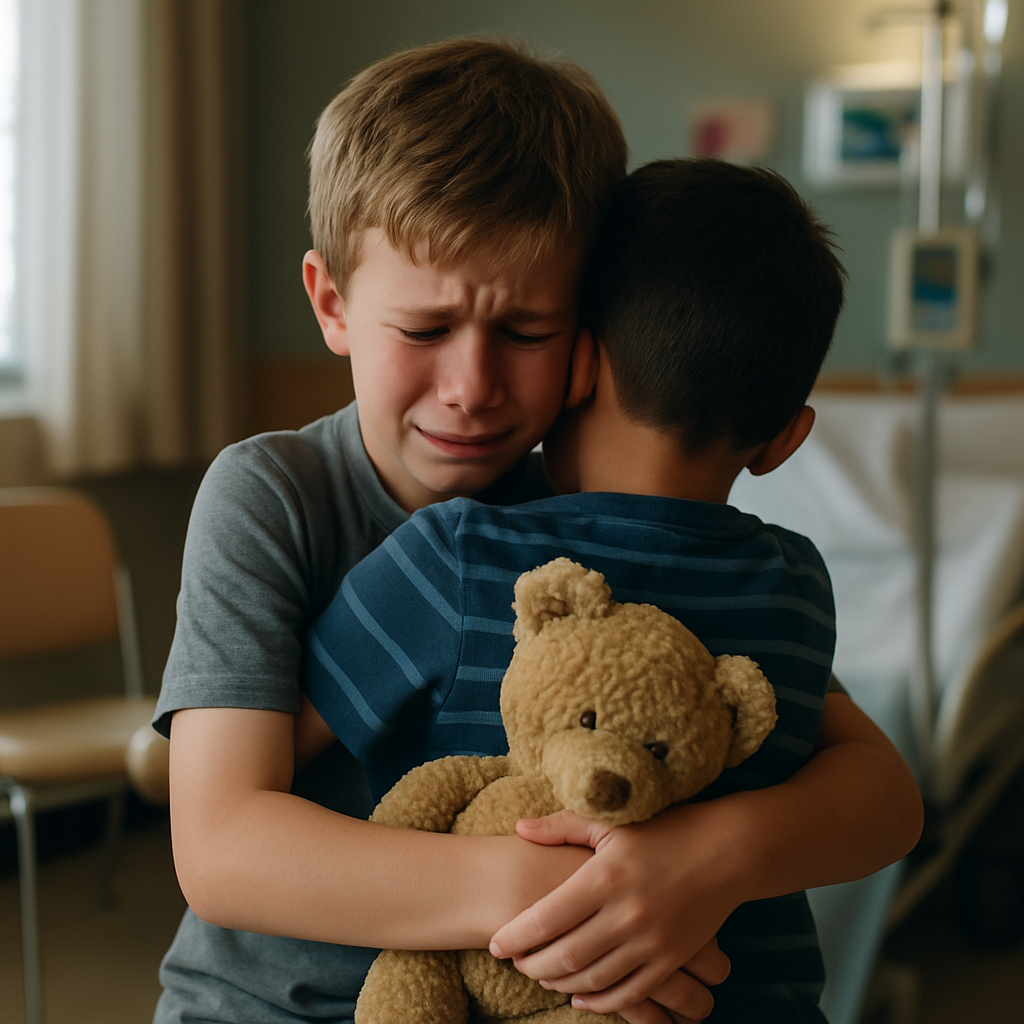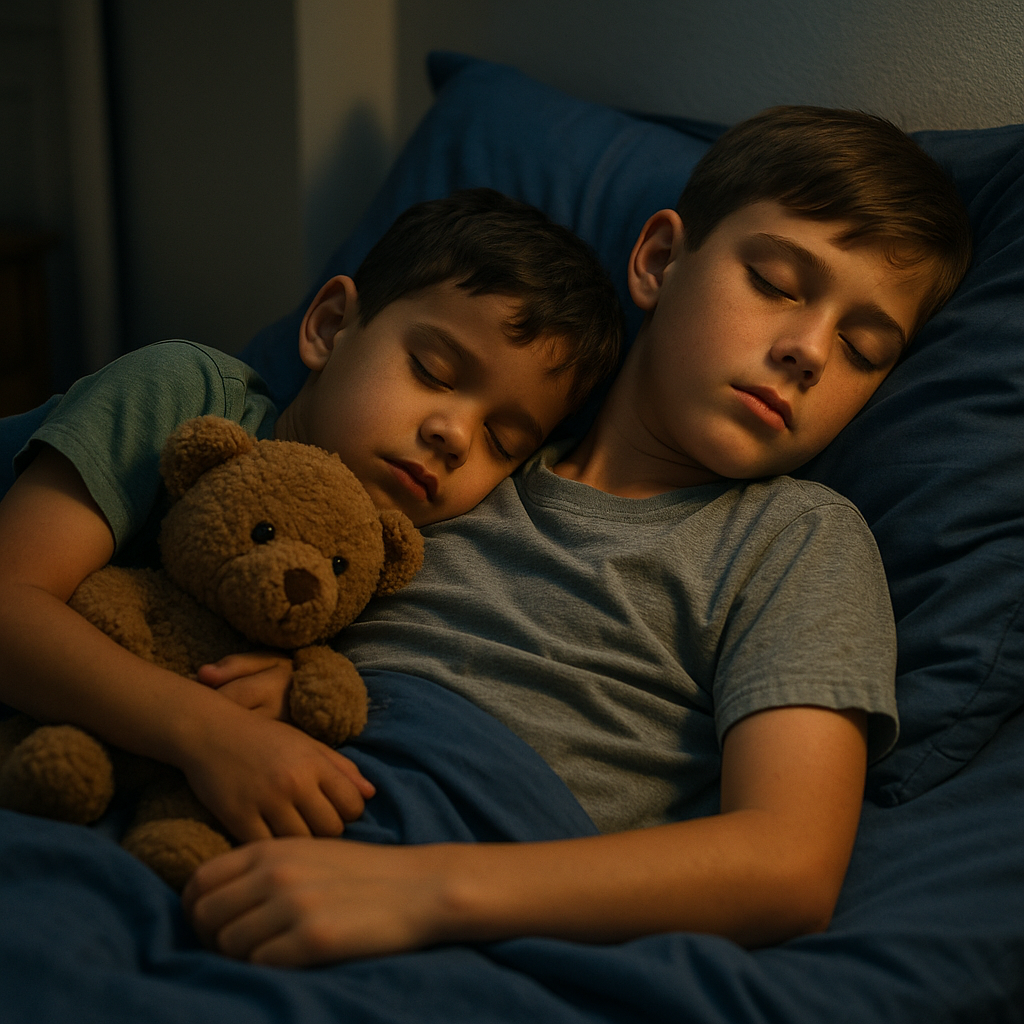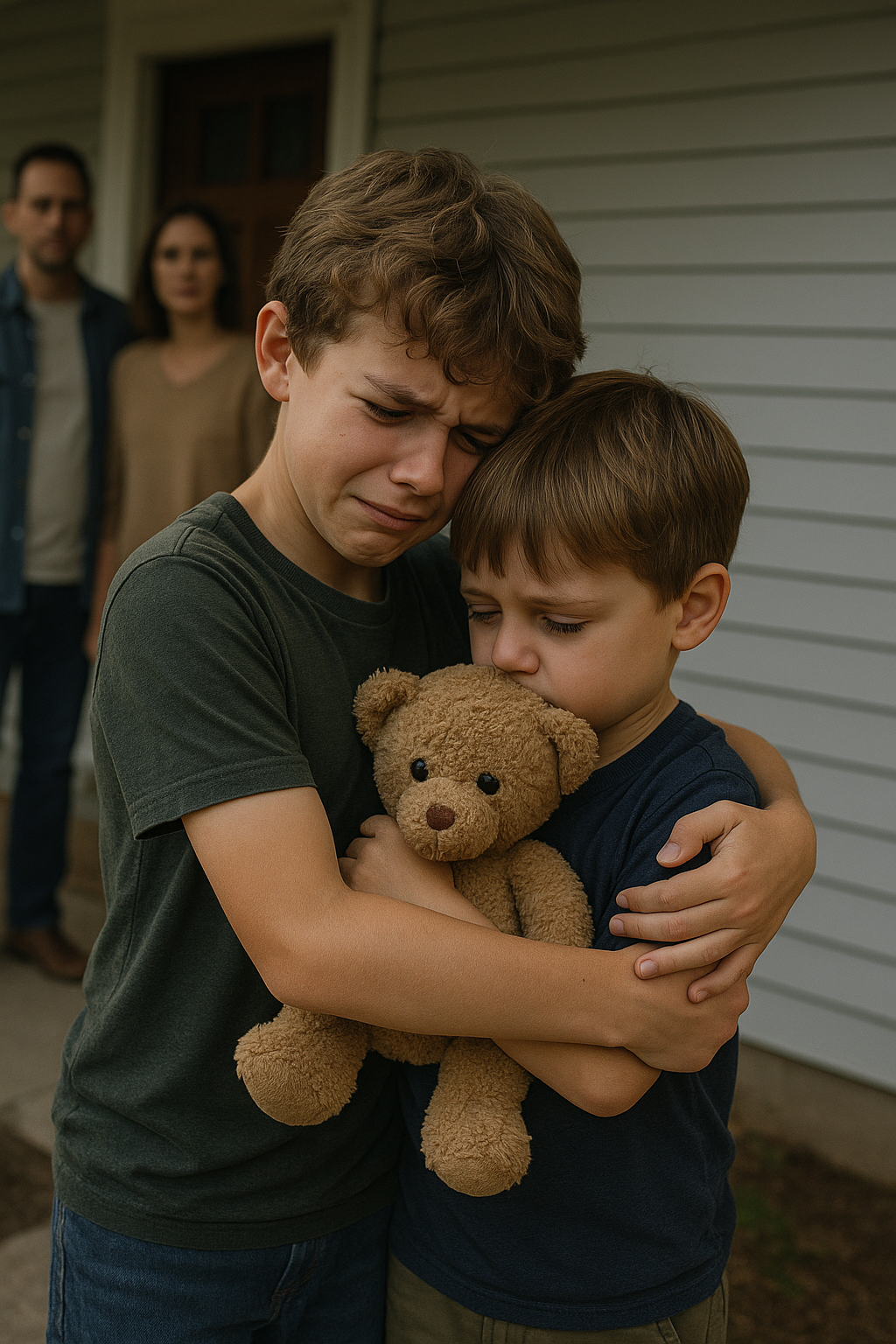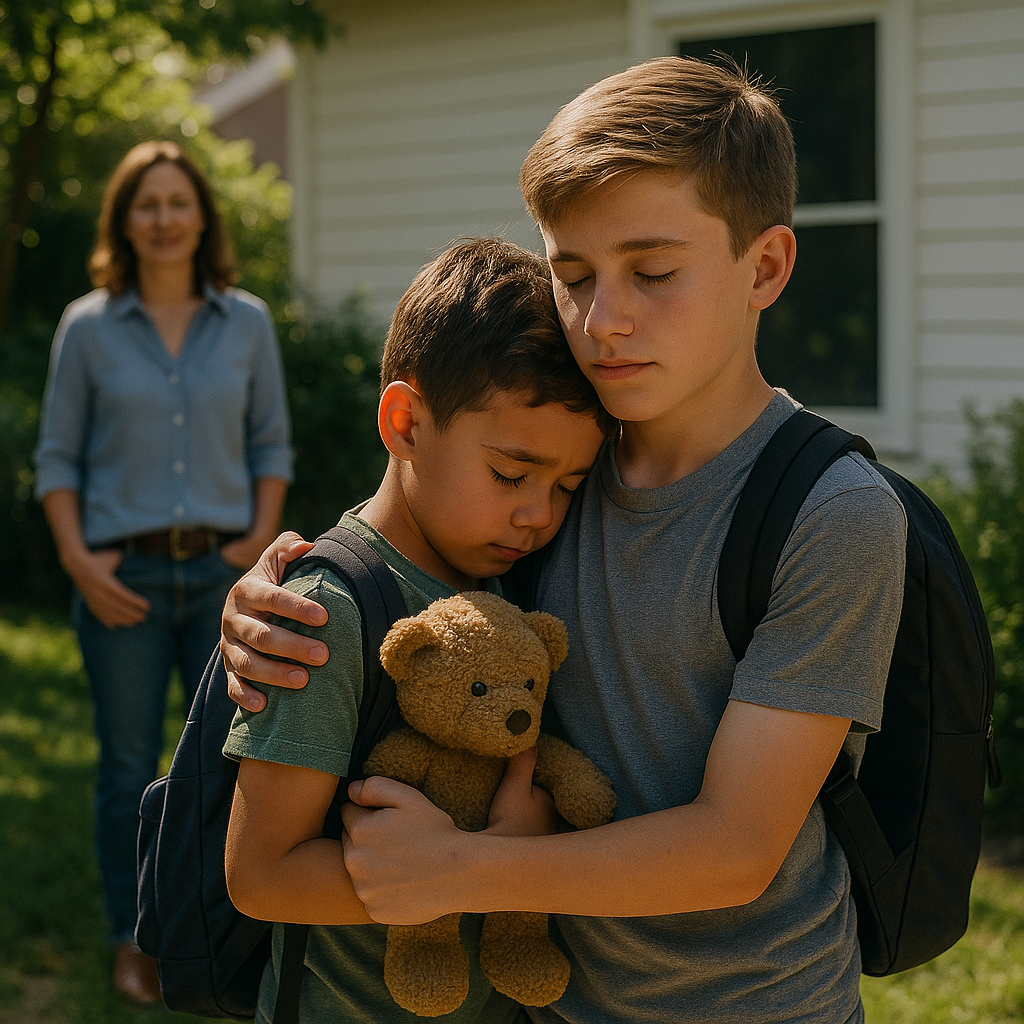The accident happened on a Thursday—I remember it clearly because it was our usual pizza night. We had just pulled into the driveway when the phone rang. After I hung up and shared the news, my son Micah stood frozen on the porch. Zayden’s parents—both gone. A sudden car crash. No warning. Just… gone.
At first, Micah said nothing. He sat silently on the steps as night fell around him. Then, in a barely audible voice, he asked, “Where will Zayden go?”

It was the first time I saw my child cry in a way that truly shook me—grief that consumed his whole body, as if it was trying to tear its way out. The next day at the hospital, Zayden sat quietly in a plastic chair, clutching a well-loved teddy bear and staring at the floor. The moment Micah walked in, Zayden ran to him and held him so tightly, it was as if the world outside no longer existed.
“I will care for him,” Micah declared. “He can stay with us.”
But the system had its own way of doing things. The caseworker, though kind, spoke with firm finality—Zayden would be placed with a temporary foster family while long-term arrangements were made.
Micah was devastated. He begged. He tried to reason. He cried himself to sleep night after night. Yet the room at the end of the hall stayed empty.
What Micah didn’t know was that behind the scenes, we were doing everything we could. There were interviews to complete, background checks to pass, parenting classes to attend, and paperwork that seemed endless. Late-night phone calls, early morning emails—it consumed us. But we didn’t tell Micah, afraid it might all fall through and break his heart again.
Then, after months of waiting, we called him outside.
He grumbled like any 9-year-old would, dragging his feet behind me and my husband. “What is it?” he asked.
We simply pointed toward the driveway.
Standing there, clutching the same teddy bear, was Zayden.

His backpack looked too big. His shoes were scuffed. But his eyes lit up the moment he saw Micah—and he ran, as if the past few months had never happened.
Micah met him halfway, arms already open, tears already falling. They embraced so tightly I thought they might never let go.
“Are you staying?” Micah asked breathlessly.
“Permanently,” I said, barely able to speak past the lump in my throat.
What followed was a blur—laughter, squeals of excitement, questions we couldn’t fully answer. We gave them space. They talked about Pokémon, spaghetti, and whether ghosts were real.
That night, Zayden fell asleep in Micah’s bed, the teddy bear between them. I lingered in the doorway, just watching. It felt right—like something once broken had quietly mended itself.
But we had no idea what lay ahead.
At first, everything seemed more than fine—it felt magical. The boys acted like brothers. Mornings became smoother. Dinner was louder, filled with jokes and giggles. Weekends disappeared into bike rides, soccer games, and backyard forts.
But slowly, cracks began to show.

Zayden started having nightmares—screams so intense they left his throat raw. He couldn’t tolerate loud noises. He avoided cars entirely. Sometimes, when we thought he was playing, we’d find him curled up in the closet, rocking back and forth.
Micah never left his side. He became Zayden’s shadow, his protector. If someone teased Zayden at school, Micah was there. If Zayden forgot his lines in the school play, Micah whispered them from behind the curtain.
It was heartwarming—but it was also a lot for a child to carry.
One evening, I gently pulled Micah aside. “You know it’s okay to just be a kid sometimes, right?”
He looked down. “I made a promise.”
“To who?”
He shrugged. “To God. When I saw Zayden at the hospital, I promised that if he ever came home, I’d protect him forever.”
My heart cracked wide open. In that moment, I saw so much of myself in Micah. The way we take on more than we can bear, simply out of love.
But children aren’t meant to carry that kind of weight.
That weekend, we enrolled both boys in therapy. They protested at first. Said it was boring. Claimed the therapist smelled like raisins. But slowly, things began to shift.
Zayden started talking about the accident. How he’d seen the other car coming but couldn’t find his voice to scream. How he woke up alone in the hospital, not understanding where his parents were.
Micah opened up too. He admitted that he sometimes missed when it was just the two of us, with our quiet pancake Saturdays. That he was afraid if he messed up, Zayden might disappear again.
There were a lot of tears. But healing doesn’t always show up as grand moments. Sometimes, it’s in the quietest signs. Like Zayden finally sleeping through the night. Or Micah agreeing to attend a sleepover after months of saying no.
Then something we never expected happened.
About eight months after Zayden moved in, we got a call from a woman in Missouri. She introduced herself as Helena—Zayden’s aunt, his mother’s half-sister. They had been estranged, but when she heard about the accident, she began searching for him.
She wanted to meet him.
We were stunned.

The caseworker verified everything. She passed all background checks. She lived in a stable neighborhood. No red flags. And most importantly—she was family.
Micah overheard one of our conversations. “Is she going to take him away?”
I didn’t know how to answer. Because legally, she had a strong claim.
We sat Zayden down and explained. His hands trembled. “Do I have to go?”
“No,” I told him. “But we think it’s good to meet her. Just to see.”
The visit was scheduled for the following week. I was nervous. Micah barely ate. Zayden didn’t sleep.
Then she arrived.
Helena. Late thirties. Kind eyes. She brought a scrapbook filled with pictures of Zayden’s mom as a teenager. She brought a box of his dad’s old CDs. She didn’t push. She simply sat across from Zayden and said, “I didn’t know about you until recently. But I’m so glad I do now.”
Zayden listened. He asked questions. He didn’t smile, but he didn’t shut down either. That night, he said he wanted to see her again. So we arranged more visits.
Gradually, he began to open up.
Micah didn’t say much.
Then one night, as I tucked him in, he whispered, “If she takes him, I won’t have a best friend anymore.”
I shook my head. “Nothing can take away what you two share. No matter where he lives.”
“I made a promise,” he said again, as if that explained everything.
“I know,” I said softly. “But sometimes, loving someone means letting them have more people to love them.”
He nodded, eyes wet.
A few months later, Zayden made his decision.
He wanted to stay with us—but visit Helena during school breaks.
It was the best of both worlds. And it worked.

Helena became family too. She came to soccer games. Helped with Halloween costumes. Sent the boys cards for every holiday imaginable—even National Donut Day.
Years passed. The nightmares stopped. The closet stayed empty.
And Micah? He grew into a young man who understood what it meant to truly fight for someone you love.
Zayden never let go of his teddy bear. But one day, he handed it to Micah.
“Why?” Micah asked, confused.
“Because I’m okay now,” Zayden said. “You carried me when I couldn’t carry myself. Now you can let that go too.”
Micah cried again—but this time, the tears were healing.
They’re both in high school now. Taller than me. Still finishing each other’s sentences. Still teasing each other over who snores louder.
But now, their laughter has a lightness. They no longer carry the past like a weight.
Just a reminder.
A reminder that the people who walk with us through our darkest storms are often the very ones who teach us how to stand in the sun again.
And sometimes… a 9-year-old really can keep a promise.


